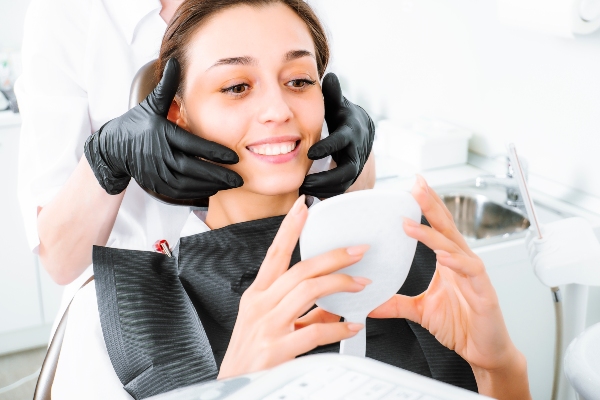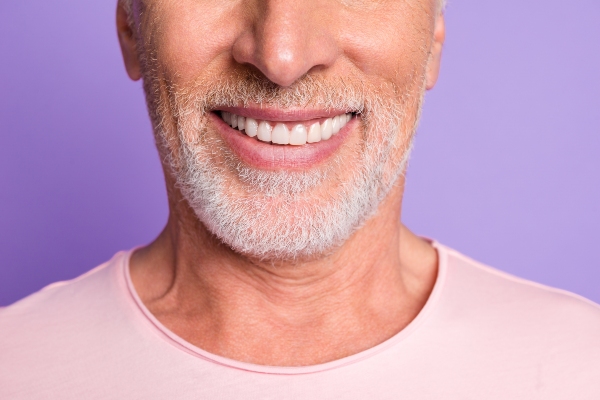Can You Have Zoom!™ Teeth Whitening While Pregnant?

You want to look in top form when you have your baby, so you are considering Zoom teeth whitening. However, you know that you need to be careful about what you put in your body when carrying a child. You do not want to do anything that could potentially harm your child, so you want to make sure the treatment is a good option when pregnant. Get the details about Zoom teeth whitening when pregnant.
Whitening teeth when pregnant
Zoom teeth whitening gel contains hydrogen peroxide. Dentists use a laser light to speed up the whitening process, allowing people to get results after a single treatment. While most people are good candidates for Zoom, it is not recommended for women who are nursing or pregnant.
Why pregnant women should not whiten teeth
Research still needs to be done regarding teeth whitening and pregnancy. While researchers have not found any information that is harmful to the fetus, there is some concern about absorbing high amounts of hydrogen peroxide into the body when pregnant. Small amounts of hydrogen peroxide are not dangerous, but large amounts can break down fetal tissue. Although researchers have not determined if that will happen with a professional whitening treatment, most agree that it is a good idea to wait until after birth. Also, women should not whiten their teeth when nursing for the same reason.
What about over-the-counter whitening products?
Over-the-counter whitening products contain many of the same chemicals as professional products do, only in smaller doses. While these products contain a lower amount of hydrogen peroxide, over-the-counter whitening products are still not recommended for pregnant women. Additional studies need to be done to determine if any type of whitening product should be used during pregnancy.
Pregnancy-related gingivitis
Dentists also recommend that women wait until after delivery due to pregnancy-related gingivitis. Hormones that occur during pregnancy increase the amount of blood that goes to the gums. This can cause tenderness and swelling, and in some cases, bleeding. Brushing and flossing daily helps curb the symptoms, but teeth whitening can make the issue worse. Women who are pregnant are more prone to experiencing discomfort after a teeth whitening procedure.
Dental cleanings to whiten teeth
While pregnant women should not whiten their teeth, professional cleanings are encouraged. During the dental cleaning, the hygienist will remove plaque and tartar, making the teeth instantly whiter. Hygienists can also remove surface stains from the teeth. A professional cleaning does not penetrate to get deep stains as a Zoom whitening does, but it still helps brighten the smile.
Do you need to wait for Zoom teeth whitening treatment?
If you are pregnant, you should wait before getting a tooth whitening treatment. You can still go to your dentist for a cleaning. The hygienist can remove surface stains, so your teeth will look much whiter. Then once your baby is born and you are finished nursing, you can come back to the office for a professional whitening treatment.
Request an appointment here: https://www.newyorkdentaloffice.com or call New York Dental Office at (212) 548-3261 for an appointment in our New York office.
Check out what others are saying about our services on Yelp: Read our Yelp reviews.
Recent Posts
A root canal removes the infected pulp, then cleans and seals the tooth. Many patients may be unsure if there is anything else they need to do after the root canal. The answer is yes; they will need a dental restoration to restore the tooth's functionality. Let us dive into why leaving a treated tooth…
A dental restoration can improve your appearance and dental health. Your dentist can help you prepare for your procedure. The consultation can also tell you how you should care for your new smile. Here are the details if you want to know how to maintain your dental restoration for lasting results.Some fluoride treatments and toothpaste…
Dental restoration is a term used to describe the process of repairing or replacing damaged, decayed, or missing teeth. Several dental restoration options are available to patients, ranging from simple fillings to more complex procedures such as dental implants and crowns. This article will explore some of the most common dental restoration options available and…
A restorative dentist can help transform dental health and restore confidence in your smile. These dental professionals address a variety of dental issues, from missing teeth to damaged enamel. The goal of restorative dentistry is to improve both the function and appearance of your teeth, allowing you to achieve better oral health and renew your…



